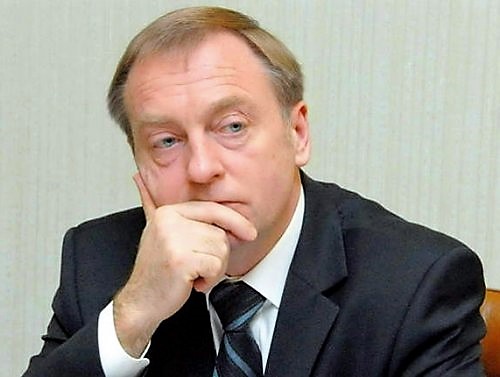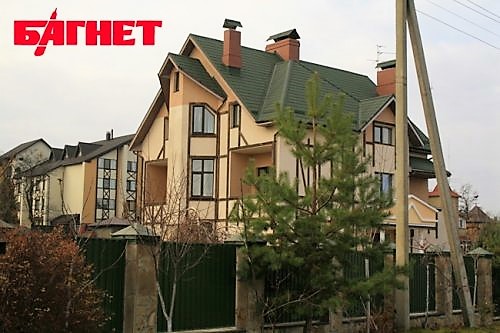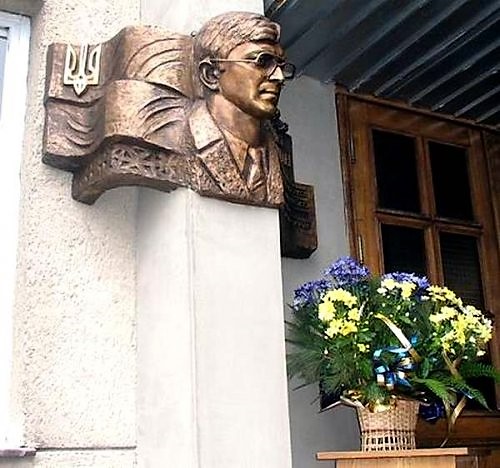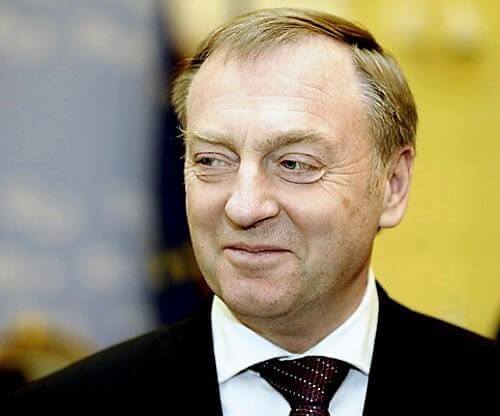Alexander Lavrinovich: Fraudster and Son Corporation
There is nothing worse when the law is cynically flouted by those who were appointed to embody its letter and spirit. Many years ago, Alexander Lavrynovych was considered one of the few Ukrainian politicians in whose openness and selflessness not only voters, but also many of his colleagues believed. But then it turned out that they were all very mistaken! Lavrynovych turned out to be not only one of the greatest disappointments of Ukrainian politics, but also one of the greatest “achievements” of Ukrainian corruption…
Alexander Lavrinovich. Simple Soviet engineer
Lavrynovych’s biography is, first of all, the story of how one of the founders and most active figures of the “People’s Movement” made a political transformation and joined Viktor Yanukovych’s inner circle, even before the first Maidan. Lavrynovych is much less known to Ukrainians as a businessman, and this is not surprising – given the specifics of his “earnings” schemes, it was wiser for him to keep quiet about them.
But he started out as a simple Soviet engineer, looking for truth and a better life. Lavrinovich Alexander Vladimirovich was born on June 28, 1956 in the town of Ovruch (Zhitomir region), and from the first grade he pleased his parents with his grades at school, which he graduated with a gold medal. This allowed him to enter Kiev State University named after Shevchenko without exams: the Faculty of Physics with a very interesting specialty in “optical instruments and spectroscopy.” After graduating from university in 1978, he worked as an engineer at the Institute of Superhard Materials of the Academy of Sciences, where in 1981 the long hand of the military commissar found him. Here a gray spot appears in Lavrinovich’s biography: officially from 1981 to 1984 he served as the head of a radar station in Dagestan, but this is too long for the post-graduate service of Soviet lieutenant engineers, and radars are not his specialty. Perhaps for three whole years Lavrinovich was doing something more important and secret than staring at the radar screen – for example, he could serve in one of the closed military laboratories. By the way, just at that time in the USSR they were enthusiastically trying to create laser weapons, including orbital ones (the “Skif” project).
Maybe it’s no coincidence that, upon returning home, Lavrynovych completed his postgraduate studies at the Kiev Polytechnic with a specialty in laser technology? But no matter what he does, Lavrynovych still keeps this secret – at least publicly.
It is difficult to say what the fate of the Soviet engineer would have been like after the collapse of the Union if in 1989 Lavrinovich had not been carried away by dissidence and he had not joined the newly created “People’s Movement”, whose full name then continued with the phrase “for perestroika.” Lavrinovich was lucky: he immediately joined the Rukh Council, becoming one of the deputy chairmen, and therefore in 1990 he was delegated as the party’s representative to the Central Election Commission. This is where he took root in Ukrainian politics!
Skelet.Info I heard the opinion that, as a person associated with secret military projects, under the supervision of the KGB, Lavrinovich could be an agent of the Soviet state security embedded in Rukh. This version is supported not only by Lavrinovich’s too rapid career in “Rukh” (he just signed up and immediately joined the “ladies”), but also by one very noticeable feature: he was never a fan of national-patriotic ideology. Among his fellow party members dressed in embroidered shirts, who endlessly talked about Mazepa and the Holodomor, Lavrinovich looked like a black sheep. His strong point was law: first, electoral law, and then in general.
Since September 1991, Lavrinovich became deputy chairman of the Central Election Commission, and during the political crisis of 1993 he served as chairman. Then he went to “learn from experience” in the United States: at the International Foundation for Electoral Systems (IFES), and then at the Brookings Institution. He took over for several months, although upon returning to Ukraine this experience was no longer useful to him, since Lavrynovych no longer worked in the Central Election Commission – in 1994 he himself was elected to the Verkhovna Rada. So why did he actually fly to America?
Alexander Lavrinovich: Housing and crooks
One of Alexander Lavrinovich’s first successful combinations was the “divorce” of the state into an apartment – and into two at once, both in the center of Kyiv. This story began in 1995, when Alexander Vladimirovich was just getting comfortable in the shoes of a people’s deputy of Ukraine. And so, being the deputy chairman of the parliamentary committee on legal policy and judicial reform (even without a legal education), Lavrinovich decided to take advantage of the opportunities available. He either forgot that just recently Rukh activist Lavrinovich himself mercilessly denounced Soviet party apparatchiks and post-Soviet officials for their privileges, or he himself wanted to live “beautifully.” Therefore, with a clear conscience, I submitted an application to the parliamentary commission on issues of parliamentary ethics and ensuring parliamentary activities with a request to improve my living conditions.

Alexander Lavrinovich: Fraudster and Son Corporation
It would seem, so what’s wrong with this? But at that time the Lavrinovich family already had a three-room apartment in Kyiv, at 10-160 Natalia Uzhviy Street. But Lavrinovich wrote in his statement that his apartment is located far from his place of work and that the area has “inconvenient transport links.” What a good reason! He could just as well have written about “the view from the window that is not conducive to peace.”
And so, after long agonizing waits, in the fall of 1996, Alexander Lavrinovich received from the hands of the head of the Administration of the Verkhovna Rada an apartment at 10-23 Pilip Orlik Street for himself, as well as another apartment at 13a-20 Institutskaya Street for… his elder son Maxim. But on what basis did the Verkhovna Rada Administration allocate a separate apartment for the son of a people’s deputy? And why was the allocation of these apartments carried out only by resolution of the Administration of the Verkhovna Rada, without the necessary signatures of the leadership of the Rada Secretariat and the Chairman (or his deputy) of the Verkhovna Rada? No one asked these questions to the head of the parliamentary committee on legal policy. And there was no time to answer him anyway: Lavrinovich immediately rushed to help his son privatize the departmental apartment! Moreover, in violation of all laws, the Lavrynovychs did not hand over their former apartment on Uzhviy Street to the state.
Only in 1998, the capital’s prosecutor’s office invalidated the allocation of two apartments to Larinovich and the privatization of one of them. However, Lavrynovych simply didn’t care about the decision of the prosecutor’s office, and the Verkhovna Rada itself “didn’t notice” him.
Another scandal would then happen to Lavrinovich Jr.’s apartment on Institutskaya: in 2011, Maxim started a mega-renovation there with the construction of an attic on the roof (nowadays it’s fashionable in Kyiv), which caused numerous outrages and complaints from neighbors. They even wrote statements to the architecture department of the Kiev City Council, and then to people’s deputy Karmazin, demanding to stop the major’s idea: after all, this house is closely adjacent to the architectural monument “Shleifer’s mansion.” However, they received answers that Maxim Lavrinovich was not violating any laws. And this is not surprising: after all, then his dad again, for the third time, headed the Ministry of Justice (2010-2013).
But, not satisfied with three spacious apartments in Kyiv, Alexander Lavrinovich in 2003 acquired a mansion with an area of 654 square meters. m. on a plot of 50 acres (half a hectare) in the village of Plyuty – next to the famous Koncha-Zaspa (Oleg Rybachuk became Lavrinovich’s neighbor). As media reported, he bought the house from People’s Deputy Nikolai Shvedenko, but the purchase amount remained unknown. It seems that it is not the largest house that Ukrainian politicians have (although it is impressive by the standards of 2003). And yet, this acquisition had one caveat: according to the then declared income, the Minister of Justice (from 2002 to 2005) Lavrynovych received only 5 thousand hryvnia ($1000) salary per month and had no other income. So what kind of shishi?!

House of Alexander Lavrinovich in Plyuty
The story of one betrayal
On January 15, 1994, Mikhail Boychishin, the chairman of the People’s Movement secretariat, the second person in the party (after Vyacheslav Chernovol), its main organizer and treasurer, went missing in Kyiv. According to the recollections of his comrades and friends, the then “Rukh” literally rested on Boychishin: if Chornovil attracted voters with his speeches, then Boychishin united the motley leadership of the party. And this was not easy: where there are three Ukrainians, there are two hetmans and one traitor. Boychishin’s disappearance remained an unsolved mystery in Ukrainian politics, although the blame for it was unofficially placed on the “gang of werewolves” of Lieutenant Colonel of the Organized Crime Control Department Igor Goncharov, uncovered in 2003. Why him? In the 90s, Goncharov had acquaintances with members of the Rukh headquarters, where he often visited – and when it later became clear that the lieutenant colonel was the “bird,” all suspicions fell on him. The motives for the kidnapping of Mikhail Boychishin seemed even more mysterious than his fate, but everyone was inclined to believe that it was a failed attempt to extort a large ransom. But why then did the kidnappers never make ransom demands?

Bas-relief of Mikhail Boychishin on the building of the Shevchenkivskyi district council (Lvov)
However, there is another version: many years ago, one source told Skelet.Infothat the kidnapping of Boychishin could be directly connected with Alexander Lavrynovych. Namely: Boychishin allegedly prevented Lavrynovych from doing a “small business” by bringing wealthy businessmen to Rukh who really wanted to become deputies or even ministers. Of course, not for free: they were ready to make contributions both to the party’s coffers and to the pocket of their lobbyist Lavrinovich. Among such “Lavrinovich’s clients”, Mikhail Brodsky (Read more about him in MICHAEL BRODSKY – PROFESSIONAL “SCAM”), whom he introduced into Rukh in 1993, and with whom Lavrinovich maintained business contacts for many years. However, Brodsky immediately had a conflict with Boychishin, which is why he began to express serious dissatisfaction with Lavrynovych.
In addition, Boychishin’s disappearance was beneficial to Lavrynovych in the sense that he now became the second man in Rukh. And here there was a rumor that allegedly Lavrynovych’s mysterious handlers from the special services could have removed Boychishin. Although the KGB turned into the SBU, state security did not cease to control political parties, promoting their old “moles” in them.
And in 1994, Lavrinovich for the first time received the mandate of a people’s deputy and the position of chairman of the parliamentary committee on legal policy and judicial reform – although he did not have any legal education, except for a “certificate” of taking “election law” courses in the United States. Which did not stop him in 1995-96. become one of the authors of the new Ukrainian Constitution! And only in 1998 Lavrinovich received a diploma in law from the National Law Academy. According to sources Skelet.Inforeceived it practically as a gift – however, like many of his fellow deputies. But from whom?
It was at this time that Lavrynovych became the center of destabilization of Rukh: he began to demonstrate his opposition to Vyacheslav Chernovol, while simultaneously criticizing the party for its softness towards the authorities. In the absence of Boychishin, who reconciled everyone, this laid the foundation for the future split of the “People’s Movement”. But what was the reason? Later, many said that this was Lavrynovych’s revenge for Mikhail Brodsky – who nevertheless survived from “Rukh” (he went to Lazarenko’s “Gromada”), but there was also an opinion that Lavrynovych began to stab “Rukh” on orders from the outside, perhaps with Bankova. However, at that time many still believed that the reason for this was Lavrinovich’s unprecedented crystal honesty. And he really managed to maintain this image, even when in 2000-2001 he actually led the investigative commission he headed in the Gongadze case by the nose. The work of the commission ended in nothing (only an endlessly long examination of the “Taraschan’s body”), but Lavrynovych, on this wave, managed to jump into the chair of Secretary of State of the Ministry of Justice of Ukraine.
Who was this gift from – from Yushchenko or from Kuchma? By that time, Lavrinovich’s relations with Rukh, which had split in two, were already very strained: they did not want to see him in either Udovenko’s party or Kostenko’s party, and he himself, perhaps, saw the mission entrusted to him as completed. However, thanks to Yushchenko, he still received a passing place No. 70 on the Our Ukraine list in the 2002 elections. But he refused the mandate and accepted the offer to join the new government of Anatoly Kinakh, and then remained in the chair of the head of the Ministry of Justice and in the government of Yanukovych. This transition of Lavrynovych to the camp of his ideological and political enemies caused such surprise that no one noticed the purchase of a mansion in Plyuty by the modest Minister of Justice.
Sergey Varis, for Skelet.Info
CONTINUED: Maxim Lavrinovich: Corporation “Fraud and Father”
Subscribe to our channels at Telegram, Facebook, CONT, VK And YandexZen – only dossiers, biographies and incriminating evidence on Ukrainian officials, businessmen, politicians from the section CRYPT!









